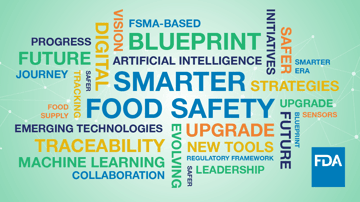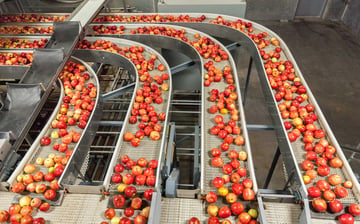In September 2020, the FDA released a long awaited proposed rule update to the Food Safety Modernization Act (FSMA) section 204. This week the period for public comments on the rule officially closed, marking a deadline for organizations and businesses to provide feedback and guidance on the drafted record keeping requirements. Read an abridged version of FoodLogiQ's comments on the traceability rule below.
At FoodLogiQ we have helped shape policy at the national level, assisting in the definition of the Produce Traceability Initiative standards and were part of the FDA’s traceability pilots that shaped regulation for the Food Safety Modernization Act. We have worked hand-in-hand with the food industry’s leading innovators to develop our traceability and food transparency solutions.
FoodLogiQ supports some of the largest foodservice operators, food manufacturers and grocers in the world. This provides us with a unique perspective regarding today’s challenges and future opportunities facing food industry partners when implementing traceability programs.
The proposed rule regarding Requirements for Additional Traceability Records for Certain Foods is an ambitious proposal to establish additional traceability record keeping requirements for the food industry. The materials provided on your website are to be commended, as they lay the foundation to support the vision of the FDA’s New Era of Smarter Food Safety.
Taking a new approach to food safety, leveraging technology and other tools to create a safer and more digital, traceable food system can be achieved. We are doing this today at FoodLogiQ, with our cloud-based Track + Trace platform, which is built on a foundation of GS1 Standards, utilizing Key Data Elements (KDEs) and Critical Tracking Events (CTEs) to support case-level traceability from farm to fork.
In our experience, there are several key focus areas critical for achieving case-level traceability:
- It requires discipline by all parties to identify products and locations, using globally unique or agreed upon standardized identifiers
- It requires the capture of product activity across multiple points along the supply chain
- It requires the ability to maintain and share that data with other partners in the supply chain to enable visibility at all levels.
In order to achieve industry-wide adoption, it is imperative that the FDA continues to refine the proposed requirements outlined in docket no. FDA-2014-N-0053, update the supporting materials on your websites, and execute an industry-wide education campaign, outlining the expectations and guidelines for compliance.
Educating the industry will be key to this proposed regulation, as the advanced traceability record keeping will not work without their participation, and strict adherence to it’s requirements. We cannot overstate this - the more consistent communication and education across the industry, the better.
As a solution provider dedicated to developing scalable, interoperable technical solutions, we support the collaborative standards development process. We participate in this process with groups such as AIM North America, GS1 US, The Produce Traceability Initiative, The Global Dialogue for Seafood Traceability, and other industry groups.
There are many solutions in place today that enable companies to achieve end-to-end traceability. These include a range of technologies such as: Artificial Intelligence (AI), Internet of Things (IoT), Machine Learning (ML), cloud-based services (i.e. SaaS), and distributed ledgers (i.e. blockchain), all of which can achieve an unparalleled level of supply chain reporting and insights. However, these technologies are inoperable if the data is not standardized, normalized and harmonized. Users need a common set of attributes and data loading options. Solution providers also need a common format so they can communicate with one another.
We request that the FDA consider the following points when drafting the final rule:
- Leverage what exists and is already in use today: The FDA has successfully partnered with a consensus-based standards group for the implementation of other legislation for healthcare with UDI and DSCSA. The FDA leveraged the technical community and existing consensus-built standards to drive successful adoption. Key Data Elements and Critical Tracking Events are being used effectively today, providing real-time traceability, as long as companies do not attempt to create their own system or standard. This slows adoption, adds cost, and makes it almost impossible to comply.
- Focus on the fundamentals of supply chain visibility: Globally Unique Identifiers contained in a Data Carrier (i.e. 2D Barcode, RFID, NFC, etc) attached to items and captured automatically at defined points (i.e. Commission, Receiving, Shipping, Transformation, Consumption) with an agreed upon set of attributes.
- Standard Terminology and a Minimum Data Set: FoodLogiQ concurs with the importance of aligning on definitions for commonly used terms to promote the common understanding. However, we strongly advise aligning with terminology defined by consensus-based standards groups to minimize misunderstandings and promote a common understanding. New terminology in the proposed regulation, terms such as Traceability Lot, Traceability Lot Code Generator, and First Receiver have caused confusion. Also, creating a clear understanding of master data and event data to avoid duplication as well as enhance data quality for products, locations, and events.
- Food Traceability List Clarification: The addition of the clarified language on 1/2/2021 was helpful, but there is still much confusion in the industry. We ask that the FDA provide more detailed lists of included items, as well as examples of items used as ingredients. There are many questions regarding the freezing of products, and other common actions to determine if they are considered a “kill step”. For example, mozzarella cheese is on the list. When frozen pizzas are manufactured, raw ingredients such as bell peppers, tomatoes and cheese are added as toppings, then the item is frozen and shrink wrapped. Is that pizza subject to the rule?
- Clearly Defining Product Recall: Providing clear guidelines as to how these should be managed, the data needed and actions to be taken can be used as a guidepost for supply chain members, industry organizations and solution providers for implementation. Recall modernization was referenced in the New Era for Smarter Food Safety Blueprint and the industry is asking for guidance.
As we move forward, companies need to adopt technology that offers precision and accuracy where it’s needed most. They need tools to communicate across supply chains to prevent tainted or poor quality products from being delivered to consumers and proactively implement corrective actions before major issues arise.
The proposed rule includes the following discussion of proposed § 1.1315(a)(1): “We encourage firms to maintain required traceability information in a single electronic system; however, we recognize there are firms that currently do not have product tracing systems that enable them to do this. We therefore propose to require firms to describe the particular types of reference records in which they keep the required tracing information to help expedite the firm's production of records and facilitate FDA’s review of those records during a foodborne illness outbreak investigation. In some recent foodborne illness outbreaks, firms' inability to quickly identify and make available to the FDA pertinent information on such matters as production, receipt, and shipment of a possibly contaminated food has significantly delayed completion of our investigation, resulting in greater harm to consumers. Furthermore, even when a firm produces the relevant records, additional delays can occur when it is difficult to find the relevant information on those records.”
FoodLogiQ fully supports the FDA’s recommendation for companies to maintain traceability information in a single electronic system. FoodLogiQ Connect allows trading partners to capture the Key Data Attributes outlined in this proposed regulation, assemble that data into Critical Tracking Events, and store the information so it is digitized and available at a moment’s notice. The delays described by the FDA in this section are far too common, and often impacted by system and resource complexities. Companies need to plan for a future where traceability data is captured, maintained and readily available.
FoodLogiQ customers leverage our platform to perform investigations, manage product withdrawals and recalls on a regular basis. This platform has proven to be invaluable when there are product or quality issues. For example, IPC/Subway recognized the value of supply chain traceability and visibility in their case study, “Delivering the Promise of End-to-End Traceability Throughout the Subway System”. Here is an excerpt from that case study.
FoodLogiQ Connect allows food companies to efficiently manage their supply chain, capture all of the data needed for a transparent, FSMA-ready supply chain, and stitch together critical tracking events to achieve real farm-to-fork traceability to quickly identify and address food safety issues.
FoodLogiQ commends the FDA for all of your efforts to communicate and educate the industry on the proposed rule. The Public Meetings, the updated website, and the ongoing outreach have been outstanding. With your leadership and direction, we can help the industry put more effective, modern food traceability approaches in place and truly move into the new era of smarter food safety. We will advance the use of technologies currently used in society and business sectors and greatly reduce the time it takes to respond to public health risks.
FoodLogiQ fully supports this regulation, and we look forward to participating in the work ahead with the FDA and industry to achieve the attainable vision of food safety.
Read FoodLogiQ's full FSMA 204 commentary on the Federal Register here.
Other posts you might be interested in
View All Posts
Food Safety
5 min read
| December 18, 2019
A New Era of Smarter Food Safety Public Comments
Read More
Trustwell News
6 min read
| December 17, 2021
FoodLogiQ Connect Surpassing 100 Million Critical Tracking Events
Read More
Food Safety
13 min read
| March 23, 2021

